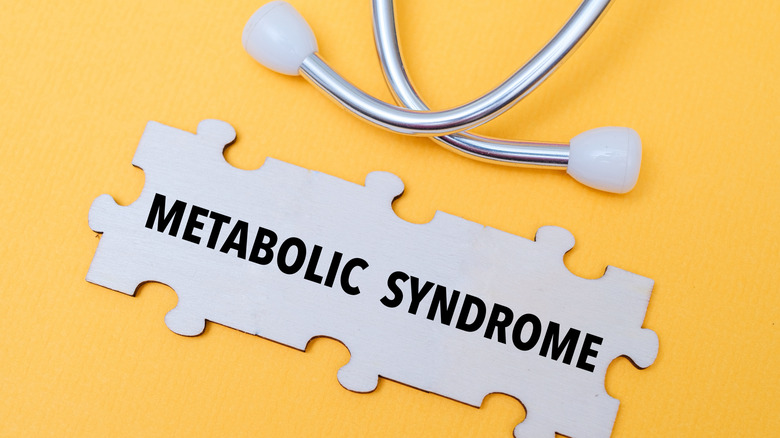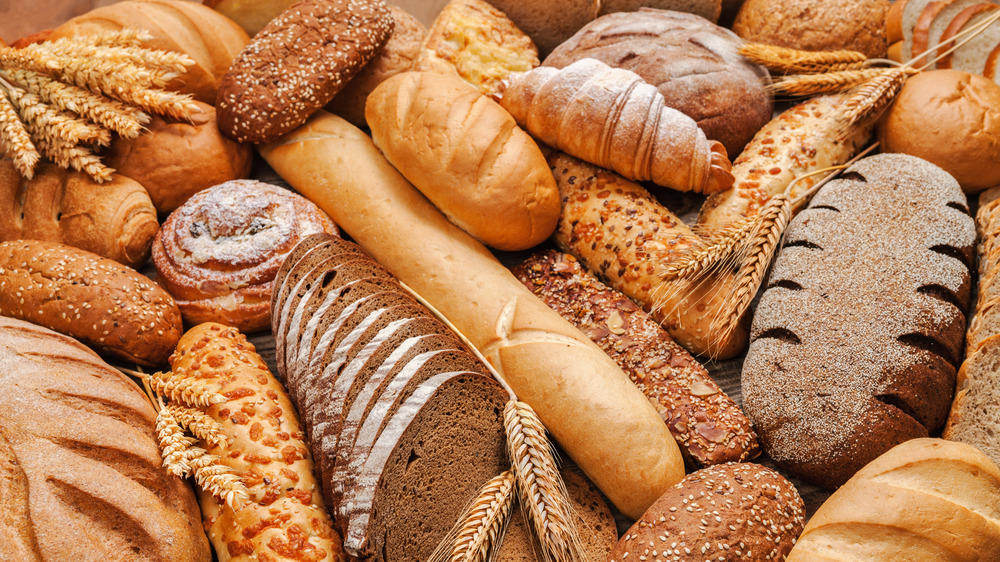You're Slowing Down Your Metabolism If You Do These Things
When we talk about "metabolism," we're talking about the body's conversion of what we eat into the energy we need for living (i.e., calories), according to MedlinePlus. When we talk about the "speed" of our metabolism, we're talking about how quickly the food we eat gets used up by our bodies as energy. The faster your metabolism, the more calories your body needs, and vice versa. Some of the factors that influence metabolic speed are completely outside our control, including height, frame size, gender, and age (via Mayo Clinic). For example, a large-boned man in his 20s will generally have a faster metabolism (one that requires more calories to function) than a small-boned woman in her 40s.
The factors over which we do have control include how much we weigh, how much of our weight is made up of muscle versus fat, what we consume (including not just food but beverages, medications, and other substances), and the types of activities in which we engage, as well as our level of physical activity (via Mayo Clinic). That's why eating more certain kinds of foods can boost your metabolism. Conversely, doing any of the following things can slow your metabolism down.
Losing weight will actually end up slowing your metabolism down
Approximately 90 percent of people who lose weight eventually gain it back, according to Kathy Beerman, Ph.D., per a 2020 research report published by the American Society for Nutrition. There's a scientific reason for this startling statistic, according to Beerman, and it's called "adaptive thermogenesis." Adaptive thermogenesis refers to the process by which the body lowers its energy needs in response to weight loss, and often disproportionately beyond what would be predicted based solely on body composition.
The mechanism behind adaptive thermogenesis is still under investigation (via a 2020 study published in Cells), but scientists seem to agree that the process is a "biologically meaningful survival mechanism" for conserving energy when the body is faced with what it has, for millions of years, been conditioned to perceive as the threat of diminishing food supply (via 2017 research paper published in Diabetes Spectrum), and it is very difficult for us to simply circumvent the process at this point in human evolution. But it's not impossible. For example, increasing protein intake may help counteract it, according to a 2020 study published in the Journal of Nutrition.
Decreasing calorie intake has the effect of decreasing caloric needs, thus slowing metabolism
The fewer calories you consume, the fewer calories you need, according to registered dietitian Justine Roth, per the U.S. News & World Report. Although this is not a new concept, it's important to note it is not the same as "adaptive thermogenesis," the process by which the body lowers its energy needs in response to weight loss. Rather, it is viewed, scientifically, as a separate factor in slowing down metabolism, according to a 2009 study published in PLOS One, that demonstrated — "for the first time" in living conditions outside of a lab — that restricting calories in humans results in their measurable metabolic adaptation.
The study also demonstrated that calorie restriction can result in "decreased physical activity levels," which, in turn, can cause the metabolism to slow even further. That's one reason why the 1200 calorie diet is not recommended for athletes. But for non-Olympian types, how is one supposed to lose weight without reducing calories? It could be that one will have better luck at weight loss by reducing calories just enough to lose weight at a healthy rate, according to Medical News Today.
Muscle loss causes the metabolism to slow down
The more muscle you have on your body, relative to fat, the more calories you burn (i.e., the faster your metabolism goes) according to MedlinePlus. Because losing weight may involve losing muscle along with fat, losing weight can lead to a slower metabolism, according to Healthline, which pointed out that one thing we can do to circumvent muscle loss while losing extra pounds is to remain active.
The fact that muscle requires more calories for upkeep than fat is also a reason why there is a tendency to gain weight as we age (via Piedmont Healthcare), which pointed out that "the average person loses an estimated 1 percent of muscle mass each year." Therefore, maintaining muscle mass is the key to preventing age-related weight gain.
One way to accomplish that is via resistance training, which offers all these benefits in addition to simply helping you maintain muscle mass. And please don't be worried about gaining weight as you gain muscle: it's just a myth that muscle weighs more than fat, according to Healthline, which clarified what really should have been obvious all along: pound for pound, muscle and fat weigh the same.
Carrying extra belly fat can decrease your metabolism
We all know that carrying extra weight is associated with a variety of health risks, from osteoarthritis to high blood pressure to heart disease and stroke to generally decreasing one's quality of life, according to the Centers for Disease Control and Prevention. However, carrying extra weight around the middle is the most unhealthy of all, according to physician, Leann Poston.
Generally speaking, belly fat is not merely an accumulation of fat under the skin. Rather, it also represents "visceral fat," which refers to fat that accumulates around the organs. "This type of deposit can put stress on the organs, including the pancreas, causing [them] to work less efficiently, thereby causing insulin resistance, which can increase blood glucose levels and the risk of type 2 diabetes," according to registered dietitian, Trista Best. Making matters worse, unlike fat under your skin, abdominal fat has a strong influence on metabolic rate, both Poston and Best told Health Digest. The more belly fat you have, the slower your metabolism can become.
Your metabolism can slow down as a result of metabolic syndrome
Metabolic syndrome isn't so much a disease as a cluster of harmful health conditions that increase one's risk of heart disease. These negative health conditions include having excess abdominal fat, abnormal cholesterol readings, hypertension (i.e., high blood pressure), and abnormally high blood sugar levels.
According to an article published in the American College of Cardiology's CardioSmart, around one-third of all Americans are walking around with metabolic syndrome, which means having any three of those adverse health conditions. In a real-life case of the whole being greater than the sum of its parts, metabolic syndrome increases one's risk of more than just the cardiovascular disease with which its underlying conditions are associated.
For example, people with metabolic syndrome have a "five times greater risk of developing type 2 diabetes than those without." In addition, metabolic syndrome is associated with chronic inflammation, according to a 2010 study published in Mediators of Inflammation. And ironically (if not terribly unfair), having metabolic syndrome may make it more difficult to lose weight because it can cause the metabolism to slow down.
Going vegan without iodine supplementation can lead to decreased metabolic rate
Thanks to a 2020 study published in JAMA Network, it has now been demonstrated that a plant-based diet can increase your metabolism. However, another 2020 study out of the German Federal Institute for Risk Assessment suggested that going vegan may not have that metabolism-boosting effect unless one is also supplementing with iodine — or at least making a concerted effort to consume enough of this essential mineral from food, which can be difficult to do on a vegan diet.
The reason is that iodine is critical to thyroid function, according to Endocrine Web, and thyroid function is critical to a healthy metabolism. A diet deficient in iodine can cause thyroid dysfunction, resulting in a slowing down of the metabolism, along with various related symptoms, including sluggishness. As a result, weight gain can be a symptom of iodine deficiency, according to Vegan Food and Living, which also pointed out that most iodine food sources are animal-based, but even plant-based iodine sources may vary in how much iodine they provide, depending on the makeup of the soil in which they are grown.
Skimping on vitamin B12 can cause metabolic dysfunction
Adopting a plant-based diet has been proven to have the capacity to increase the speed of your metabolism, according to a 2020 study published in the JAMA Network. That being said, it may be critical for weight loss on a vegan diet to supplement with vitamin B12. The reason is that, as revealed by a 2020 study out of the German Federal Institute for Risk Assessment, without supplementation, a vegan diet can put you at risk of vitamin B12 deficiency. Vitamin B12 is critical to metabolic function, according to 2011's, Public Health Nutrition in Developing Countries.
"Vitamin B12 could affect body fat and metabolism" Healthline noted, citing a number of studies, including a 2020 research paper published in Nutrients, which pointed out that a number of studies "have demonstrated a relationship between the importance of vitamin B12 ... and various components of metabolic syndrome," which, itself, is associated with a decrease in metabolic speed (via 2010 study published in Mediators of Inflammation). A number of observational human studies, as well as clinical animal studies, concur, but more research will be needed to better understand the mechanism behind this.
You may be slowing down your metabolism if you're skimping on protein
One of the signs that you're not eating enough protein is otherwise-unexplained weight gain (or if you're trying to lose weight, an otherwise-inexplicable plateau). One reason is that protein plays a role in stabilizing blood sugar levels, and fluctuations in blood sugar levels have been associated with weight gain and with difficulty in losing weight, according to dietitian and health coach Cassie Christopher.
If that's not all, according to a 2013 study published in the Journal of Epidemiology, low protein intake (anything less than 16 percent of total calories) has been scientifically associated with poorer quality sleep, as well as a difficulty/delay in falling asleep. And sleep loss has been shown to have negative effects on one's metabolism. For example, in one study, cited by the authors of a 2010 research paper published in the International Journal of Endocrinology, a single week of sleep deprivation was shown to have the potential to result in "significant alteration in metabolic and endocrine function."
Sleep deprivation can cause metabolism to slow down
"There is rapidly accumulating evidence to indicate that chronic partial sleep loss may increase the risk of obesity and diabetes," according to the authors of a 2015 research paper published in the Annals of the New York Academy of Sciences. One reason may be that a lack of sleep can interfere with the ability to control one's appetite. Some studies have observed that sleep deprivation can alter the endocrine system's release of the appetite-regulating hormones, leptin and ghrelin, leading to overeating.
Another theory is that sleep loss can cause metabolic "dysregulation" via "myriad pathways involving sympathetic overstimulation, hormonal imbalance, and subclinical inflammation," as revealed by a 2010 research paper published in the International Journal of Endocrinology. To put it in layman's terms, not getting enough sleep can cause your metabolism to slow down, which can increase your risk of weight gain, obesity, and even type 2 diabetes. Even a single week's worth of sleep loss has been shown to have that effect, according to the study authors.
Getting older can slow your metabolism
There's nothing you can do to stop the aging process and all the inevitable ways it changes your body in time, but recognizing and accepting that our metabolism has a tendency to slow down as we age can help prevent weight gain over the passing years. "As we age, our metabolism slows and the rate at which we break down food decreases by 10 percent each decade after age 20," according to Piedmont Healthcare, whose registered dietitian and bariatric coordinator, Karen Andry pointed out that "by the time we're 50, there's a 30 percent drop."
In part, this slowdown can be blamed on hormonal changes. For example, estrogen is a hormone that helps regulate metabolism, and in turn, body weight. It is well-known that estrogen levels in women decrease markedly with age, per Medical News Today. However, men also experience decreased levels of estrogen as they age (via Medical News Today). According to MedlinePlus, another reason is that muscle mass diminishes with age, and a loss of muscle mass can slow the metabolism as well. However, one way to circumvent age-related muscle loss is to regularly engage in resistance training.
Some medications can slow down your metabolism
"An unexpected increase in weight can be concerning for anyone. But it's an unfortunate side effect of many common medications," according to Benita Lee, who has a Master's Degree in Public Health and is part of the research team at GoodRx. Such medications include "insulin, blood pressure medications, antidepressants, and even migraine medications." The mechanism behind this side-effect depends upon the particular medication. But in many cases, it has to do with the way the particular medication affects the metabolism.
For example, insulin, which many type 1 diabetics have to take daily, is a growth hormone that can cause the body to create and hold onto fat cells. Some blood pressure-lowering medications, and especially those known as "beta-blockers," are associated with metabolic slowdown. And some medications, including antihistamines and certain antidepressants, can interfere with your energy levels, which could interfere with your ability to exercise (via GoodRx).
Consuming foods made from white flour can slow your metabolism
There has long been a debate among scientists about whether a "calorie is a calorie," according to LiveScience. On the one hand, some scientists, such as Georgetown University scientist, Barbara Howard, say the "bottom line" is if you cut calories, you'll lose weight. On the other hand, scientists such as Harvard University's health researcher, Monica Bertoia, say that depending on the food, the calories can cause either increased or decreased hunger and increased or decreased calorie-burning.
For example, a 2020 study published in the JAMA Network demonstrated that a low-fat plant-based diet can help reduce body weight both by reducing calories and by increasing post-meal metabolism. And certain foods can likewise cause the metabolism to slow down, according to registered dietitian, Tanya Zuckerbrot (via Prevention). One example Zuckerbrot offered is white flour, which "has little to no fiber" and can therefore slow down digestion and metabolic rate, as Zuckerbrot explained. In other words, unlike plant-based foods that are rich in fiber, white-flour foods are easy-to-digest, leaving the metabolism "operating at a slower level."
Consuming sugar-sweetened beverages is a surefire way to slow down your metabolism
High fructose corn syrup, which is present in many sugar-based soft drinks, has been proven repeatedly to negatively impact metabolism, according to a 2017 study published in PLoS One. "Sugar from soda that you're not using for energy can get stored in and around the abdominal organs (known as visceral fat)," according to registered dietitian and health coach Cassie Christopher, citing a 2016 study published in Circulation. As a 2010 study published in Mediators of Inflammation notes, "visceral obesity seems to play a central role in the metabolic syndrome," and as such, can slow down how quickly one can burn calories.
Further, a 2012 clinical trial published in the European Journal of Clinical Nutrition demonstrated that over a 10-week period during which overweight and obese people consumed soft drinks sweetened with fructose, their "resting energy expenditure ... decreased significantly." As revealed by a 2004 study published in the American Journal of Clinical Nutrition, "The digestion, absorption, and metabolism of fructose differ from those of glucose."
Consuming foods rich in omega-6 fatty acids can cause your metabolism to slow down
Consuming foods high in omega-6 fatty acids without balancing them with foods high in omega-3 fatty acids (foods like wild-caught salmon, tuna, and walnuts) is associated with metabolic syndrome, according to a 2016 study published in the academic journal, Nutrients. Metabolic syndrome occurs when someone has at least three of the following negative health conditions: abdominal obesity, high blood pressure, high cholesterol, and high blood sugar (via CardioSmart). One of the consequences of metabolic syndrome is a change in metabolism such that it becomes more difficult to lose weight, according to a 2010 study published in Mediators of Inflammation.
Consumption of a high amount of omega-6 fats relative to omega-3 fats was may also negatively impact insulin resistance, according to Bicycling, which cites the aforementioned 2016 study. Taking well-balanced fish-oil supplements can help reduce the imbalance while also offering all these other benefits.















